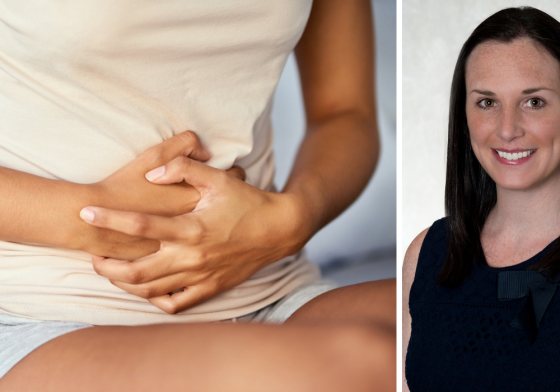
Irritable bowel syndrome, known as IBS, has been generating a lot of headlines in our area lately because of the ways in which it affects women. Rockville specialist Leigh Lurie, MD uses her expertise to shed some light on the connection and what can be done about it.
IBS is a chronic condition affecting the gastrointestinal tract, especially the large intestine (or colon). Although it affects about 10% of the general population, women are at least twice as likely as men to be diagnosed with IBS. It is uncertain why women are more likely to suffer symptoms from IBS, but it is thought to be due to hormonal changes. This may explain why IBS often affects women differently.
Symptoms of IBS in women
There are several common signs of IBS:
-
abdominal pain
-
cramping
-
painful gas
-
change in bowel habits
-
diarrhea
-
constipation
-
loss of appetite
Some patients with IBS are more prone to diarrhea, while others may have more constipation. There is also mixed IBS in which bowels alternate between diarrhea and constipation. Women with certain gynecological disorders (endometriosis, for example) may experience more stomach upset than women who don’t. Any of the symptoms mentioned so far would warrant seeking a trained professional. If you are over the age of 50 or if your IBS symptoms are associated with weight loss, rectal bleeding, anemia or if you wake up at night to have bowel movements you should make sure to see a specialist for an evaluation.
It is common for IBS to be affected by changes in hormones. This is why some women notice their symptoms are worse around the time of their period. Oddly enough, for many women, pregnancy results in a temporary improvement in IBS symptoms.
Managing IBS symptoms
Because IBS is a chronic condition, people who have it should be prepared to manage the symptoms. For example, if you notice certain foods trigger your symptoms it is best to limit or avoid these foods. It is also important to drink plenty of non-caffeinated beverages during the day to stay hydrated. Exercise has been shown to decrease symptoms as well as managing stress. If you continue to have symptoms it is best to discuss them with your doctor. There are medications, both over the counter and prescription, which may help to further treat symptoms.
Possible IBS Triggers
In women, IBS is likely triggered by food, stress, inflammation, infection and hormones – or even a mix of these things. When it comes to foods, certain kinds are known to cause more symptoms than others.
- Dairy products, such as milk, cheese and ice cream which contain lactose
- Too much insoluble fiber
- Fried foods
- Fatty foods
- Gluten-containing foods such as wheat, barley and rye
- Gas-inducing foods
- Artificial sweeteners
There is emerging evidence that a diet low in FODMAPs improves symptoms of IBS. FODMAPs stand for different chemicals that naturally exist in the foods we eat, including fruits and vegetables.
Other factors
IBS can cause significant symptoms. People are sometimes amazed at how much diet or stress can play a role in triggering symptoms. That said, with diet modification and stress management people can experience tremendous improvement in their symptoms. If you are having symptoms it is important to discuss them with your health care provider who would be able to prescribe any treatment or medications that may be necessary to help you to experience optimal health. In short, there are things we can do to help you.